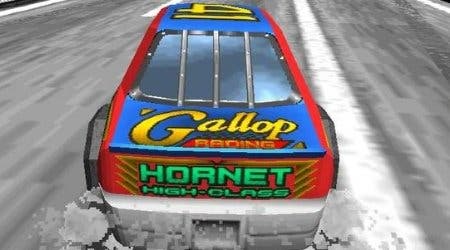Daytona USA Review
Arcade perfected.
Team Hornet's number 41 car isn't as exotic as Out Run's stable of prancing horses, with their whispered promises of fun in the sun on an endlessly unfurling road. It has none of the slippery precision of Sega Rally Championship's Delta and Celica, the off-road duo that provided Tetsuya Mizuguchi's game with its razor-sharp power slides. And it can't claim to have pushed back the 3D frontiers as Virtua Racing's polygonal powerhouses did.
But car number 41, more so than its cohorts, is an icon - a totem of a time when Sega's imagination ran as wild as the stallions galloping beside Daytona USA's Sea Side Street Galaxy, and now a fitting epitaph to a genre that seems, not for the first time, to have breathed its last.
As a revival, this touched-up outing for Xbox Live Arcade and PlayStation Network is as full-blooded and sure-footed as it gets. Textures are carefully guided into the often-unforgiving world of 720p, the soundtrack's been sent back to the recording studio now it doesn't have the din of an arcade to hide behind and it's kept every one of its 60 frames per second.
Sega's work here goes a little beyond the promise of an arcade perfect port, too. Like Bluepoint Games' recent work for Sony on the God of War and Team Ico Collections, this is Daytona USA as you remember it rather than how it actually was: dim memories of its rolling blue skies and Tonka Toy cars unearthed and gifted back to you in full HD.
It's a revival that's subtly revisionist, though it's all in the best possible taste. The pop-up that marred the original Model 2 board has been smoothed, if not eradicated completely, while the more detailed textures work in tandem with an unwavering frame rate to hide Daytona USA's 18-year vintage well.
And fortunately age doesn't seem to have ravaged Daytona USA's core, which proves as timeless as any racing game of the last twenty years. As tradition dictates - and it's arguable that Daytona USA has dictated much of the tradition here - it's a race against a ticking clock as much as it is your fellow racers, as you pick up fistfuls of seconds on passing each checkpoint.
The devil's in the details, and that's truer than ever in Daytona USA. Whether it's the oversized fruit machine that straddles the back straight of the speedway, playable with a few jabs of the select button, or the seagulls that chase you down atop Sea Side Street Galaxy's cliff-top run, it's set in a world that's endearingly playful.
Truth be told, Daytona USA's handling isn't quite the measure of its peers. Its drifting doesn't benefit from the organic arcs that contributed to OutRun 2's genius and it lacks the tactility of Sega Rally Championship, but what's here is truer to the arcade original than anything achieved before it - and a darn sight better than the Daytona USA 2001's ham-fisted appropriation on the Dreamcast.
"This is the perfect example of how to revisit your back catalogue."
As befits its stock-car inspiration, Daytona USA offers a weighty ride that's heavy on momentum, its drifts snappy and demanding far more attention than other, more forgiving racers. Steering wheel support helps unlock its full potential, though it remains an acquired taste for a more modern palette.
There are few concessions to modernity, although Sega has seen fit to include a rewind feature. Ferretted away in the pause screen it's a strange cameo, although the unobtrusive blunting of the difficulty curve inherent with older games helps ensure that it's a welcome one.
Regardless, it's all easy to engage with when the playground's so iconic. All three original courses are here, and they're a joy to return to. Three Seven Speedway remains one of arcade racing's cathedrals, the three-turned oval possibly usurping the game's namesake in the minds of a entire generation (and I still remember the pang of disappointment when I realised that the real-life Florida speedway wasn't encircled by a cliff with Sonic's image delicately chipped onto its surface).
Dinosaur Canyon, the mid-tier track, is a rollercoaster of impossible cambers and stomach turning dips, a forerunner in many respects to developer Toshihiro Nagoshi's more unhinged creations in both Super Monkey Ball and F-Zero GX. Finally, Sea Side Street Galaxy, with a lap time that sneaks in at just under two minutes, is arcade racing's Nordschleife - a long, sinewy course that demands concentration and complete mastery of Daytona USA's unique handling model.
Even taking into account the requisite mirrored courses, Daytona USA is light on content, but Sega's been smart to dig deep into what's already there rather than adding to it. Sitting alongside the arcade original - which itself is presented across various difficulties, with various options including the ability to play with the original Japanese menus - there's a generous and thoughtful suite of extras.
Survival Mode takes the second-scrounging nature of Daytona USA's checkpoint races to a logical and satisfying conclusion; here, time's also rewarded for clean cornering, overtakes and drifts, with the aim being to cover as much ground as possible before the counter hits zero. There's a touch of the Gothams in how it balances constant reward against a ticking clock, and it's enlivened, as is much of Daytona USA's content, by full leaderboard support.
Challenge Mode presents a warm reminder of Sumo's work on its various OutRun 2 conversions. Split evenly across all three courses, it's a diverting run through bite-sized objectives - although it's lacking a little of the imagination that provided Coast 2 Coast's parallel mode with such a strong pull.
It's Karaoke Mode that really gets to the big, dumb heart of Daytona USA though. Light on features and with no tangible scoring system, it simply overlays the lyrics of Takenobu Mitsuyoshi's stirringly cheesy soundtrack to the game, inviting you to sing along - as if you ever really needed an invite to sing along to Sky High anyway. It's throwaway stuff that nevertheless inspires the widest of smiles.
It's also a savvy acknowledgement of the original's appeal, and of Daytona USA's status as a sing-a-long classic - you know the words just as well as you know each swerve in the road. Alongside the recent port of Guardian Heroes, this is the perfect example of how to revisit your back catalogue. With 18 years' worth of dust carefully brushed aside, Daytona USA has been lovingly restored and thoughtfully explored - providing a fitting tribute to one of arcade racing's enduring icons.










